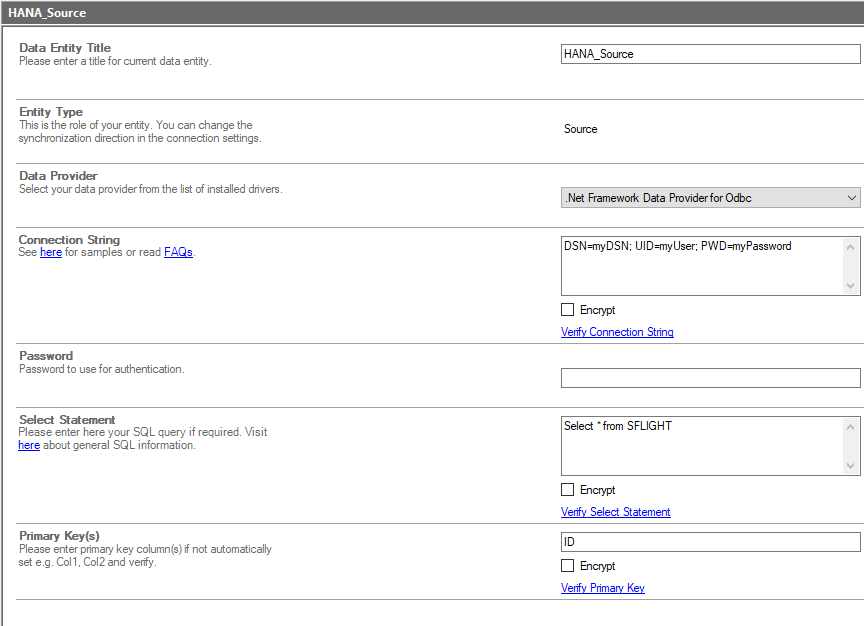Keep your SAP HANA in sync. Download and try today.
SAP HANA Integration with Office 365, SharePoint and 150+
SAP HANA data can be integrated and synchronized codeless with various other data sources using the Layer2 Cloud Connector via the HANA ODBC Data Provider. Please take a look here for supported systems and applications. You can also use the SAP HANA .NET provider. Alternatively, you can prepare your SAP HANA for OData access as noted here, and connect via the Layer2 Data Provider for OData.
To connect to HANA source using ODBC, data source entity must be configured as follows in the Layer2 Cloud Connector Connection Manager:

Fig. Sample connection configuration to connect to SAP HANA data via ODBC.
SAP HANA Codeless Integration and Synchronization Specific Settings
Please note the following specific settings.
- Install the HANA ODBC driver (HDBODBC32 or HDBODBC64). These are normally installed with the HANA Client. Note that the driver architecture must fit to the Cloud Connector version installed (32- or 64-bit).
- Follow the vendor instructions to setup and configure a DSN. See page 14 in this SAP document for setting up a HANA ODBC data source.
- Select the ODBC Data Provider to connect. The provider is part of the Windows Operating System and should be already installed.
- Use a System DSN (not User or File DSN) to setup your connection and to refer to in the connection string. Verify your setup directly in the ODBC Connection Manager, if supported.
- You can use a connection string like this to connect:
DSN=myDSN; UID=myUser; PWD=myPassword
Please find more details about ODBC options at www.connectionstrings.com. - You can make use of ODBC to query your data as supported by the data provider and source system. For any specification of query language supported see the HANA documentation.
- For the SAP HANA .NET provider use a connection string like this: Server=yourserverip:port;UserID=youruserid;Password=yourpassword. More information about the provider settings can be found here.
- You can map your data fields to specific external source fields in the Layer2 Cloud Connector. Please take care about data types (simple type conversions are supported).
- Please enter an appropriate primary key (column with unique values), depending on query (see data preview for this).
- You can use the connection for uni- or bi-directional synchronization. In case of inserts (full CRUD) via external systems please take care of the primary key. Database-side IDs will not work in this case.
- No installation or changes are required at the SAP HANA / ODBC data source or the data destination.
- Data synchronization can be started manually in the Connection Manager, on-demand per command line or scheduled in background by the Layer2 Cloud Connector Windows Service. Only data changes are processed (no delete / bulk import).
- No programming required for setup a connection and sync.
- No need to open your local network for access from outside.
Step-by-Step Intros for SAP HANA Integration and Synchronization
Just some ideas about systems to connect and sync:
- Sync with local SQL or SQL Azure for better reporting via SSRS.
- Sync with Office 365 / SharePoint lists to expose HANA data to external users for change notification and workflows. Make use of Office 365 for Hana data acquisition.
- Sync with 3rd party apps like ERP/CRM/CMS based on SQL databases like Oracle, mySQL or Microsoft SQL Server.
- Sync with Microsoft Exchange Online for mobile access on any devices.
Do you have connected more? Just let us know. Can't find what you are looking for? Please contact sales@layer2solutions.com directly for more information.
Ready to go next steps?




